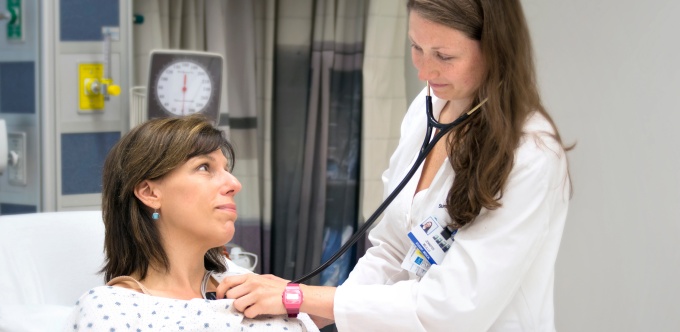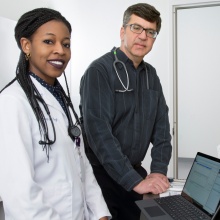
During Phase 2 of training, we’ll challenge you to use your strong foundation of knowledge well beyond the classroom as you embark on core clinical clerkships.
Phase 2: Gain Clinical Experience
Activate your understanding of content through people-centered practices in the second phase of our program. You’ll benefit from a curricular experience that integrates content mastery and compassionate care practices early and often, shaping who you become as a physician.
Phase 2 is the energizing time when you’ll embark on core clinical clerkships! It launches with a clinical orientation packed with key clerkship information, plus a review of essential skills for Phase 2 success.
Next, our Clinical Reasoning and Synthesis course helps you capitalize on the clinical reasoning skills you built in Phase 1. It will furnish you with tools and approaches to improve your accuracy in diagnosis and treatment choices. Invigorating problem-solving sessions will prepare you to apply your knowledge to patient care.

Core clerkships consist of four 12-week blocks, with two disciplines integrating their content within a single block. Integrated clerkship blocks are:
- internal medicine + family medicine
- neurology + psychiatry
- obstetrics and gynecology + surgery
- pediatrics with a four-week elective
Each 12-week block incorporates an onboarding week that focuses on specialty-specific content and skills, revisits core foundational science content related to the specialty, and provides opportunities to integrate all five curriculum pillars.
Take Valuable Opportunities to Assess Your Clinical Skills
Each block has an off-boarding week known as “I-CARE week” that gives you time and educational activities for integration, coaching, assessment, reflection and exploration.
Why is the I-CARE week advantageous for you? In short: You have opportunities to assess your clinical skills. Assessment modalities, such as Observed Structured Clinical Encounters, allow you to practice and demonstrate clinical skills in a standardized medical scenario.
Additionally, during the I-CARE week, you will continue to meet with your learning community and engage in self-reflection with your community’s faculty coach.

Our Well Beyond curriculum enables you to learn through service to disinvested communities facing barriers, with many community members challenged by significant health and social inequities.
Service learning combines community service with explicit learning objectives, preparation and reflection. As a Jacobs School medical student, you’ll provide direct community service while learning about the context in which the service is provided, the connection between the service and your academic coursework, and your role as a citizen.
CommunityConnect is a core educational experience embodying a bidirectional relationship. This means that as a student, you can support the needs of communities and their members — all while enriching your own understanding of our Buffalo communities and neighbors.
By participating in CommunityConnect, you’ll have opportunities to:
- serve as a liaison ambassador between the Jacobs School, health care and the community
- understand structural aspects, processes, strengths and challenges of CBO and its community work
- appreciate structural and social determinants of health impacting individuals and communities served
- develop proximal working and service relationships with CBO staff and community members
- participate in advocacy, community education and other associated activities to aid the CBO and/or its causes and work
- understand health experiences of community members
Through CommunityConnect, you’ll feel the benefits of engaging in longitudinal community service with a Buffalo community-based organization (CBO), as these partners can:
- help you, as a student ambassador, understand and connect with community/members through community-facing work
- take multiple student ambassadors two to four times per month
- provide service learning work for three hours weekly, every other week
- connect you with community members for health care discussions
- give feedback on your participation
Community partners
Our community partners include:
- Compeer Buffalo, which provides social support in the form of friendships to individuals (age 6 and up) who are striving for mental well-being
- Big Big Table Community Café, which provides a dignified response to food insecurity and hunger in Buffalo by providing our community with accessible, affordable and nutritious meals
- Buffalo Prenatal Perinatal Network, which focuses on improving pregnancy outcomes; promoting better maternal and infant / child health care; establishing better linkages between existing programs; and ensuring that families have access to the full range of preventative and primary health care, social support and educational resources in Erie County
- GObike, which has a mission to promote active mobility options, trails and greenways, and complete streets in Western New York — and connects and empowers communities through advocacy, education, planning and engagement
CommunityConnect enables you to serve on teams of three, with each team attached to a community-based organization (CBO).
As a first-year student, you’ll work with your CBO one day for three hours every other week, for three semesters.
To better address the issue of continuity of service, second-year student teams will continue to support their CBOs into their second fall semester while onboarding the incoming first year team before the second-year teams finish their fall semester and leave the CBOs.
Second-year students will continue their service learning in the first and third weeks of their fall semester as a way to orient new first-year students. Following the first month, second-year students will alternate weeks with first-year students, doing their service learning hours in the second and fourth weeks.
Here’s how your second and third years in medical school will look:
Year 2
Year 3
Visualization map for year 3 (click to zoom).

